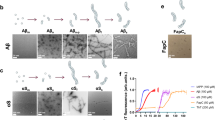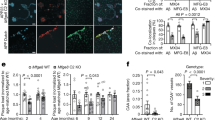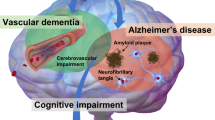Abstract
DEPOSITS of β-amyloid are apparent in ageing and Alzheimer's disease1, but the role of this peptide in neurodegeneration is unclear2. The free-radical theory of ageing may also account for Alzheimer-type degeneration and consequently links between free-radical generation and β-amyloid have been sought3. We demonstrate here that β-amyloid interacts with endothelial cells on blood vessels to produce an excess of superoxide radicals, with attendant alterations in endothelial structure and function. The superoxide radical can scavenge endothelium-derived relaxing factor and produce potent oxidizing agents, which can cause lipid peroxidation and other degenerative changes4. The alterations in vascular tone and endothelial damage are prevented by the oxygen-radical-scavenging enzyme superoxide dismutase. These observations suggest a normal vasoactive role for β-amyloid as well as a mechanism by which β-amyloid may play a role in vascular abnormalities and neurodegeneration mediated by free radicals.
This is a preview of subscription content, access via your institution
Access options
Subscribe to this journal
Receive 51 print issues and online access
$199.00 per year
only $3.90 per issue
Buy this article
- Purchase on Springer Link
- Instant access to full article PDF
Prices may be subject to local taxes which are calculated during checkout
Similar content being viewed by others
References
Glenner, G. C. & Wong, C. W. Biochem. biophys. Res. Commun. 122, 1131–1135 (1984).
Price, D., Borchelt, D., Walker, L. & Sisodia, S. Neurobiol. Aging 13, 623–627 (1992).
Mattson, M. P. Nature struct. Biol. 2, 926–928 (1995).
Lipton, S. et al. Nature 364, 626–632 (1993).
Furchgott, R. F. & Zawadski, J. V. Nature 299, 373–376 (1980).
Scholz, W. Z. Neurol. Psychiat. 162, 694–715 (1938).
Buee, L. et al. Acta Neuropath. 87, 469–480 (1994).
Davignon, J., Gregg, R. & Sing, C. Atherosclerosis 8, 1–21 (1988).
Kukreja, R. C., Kontos, H. A., Hess, M. L. & Ellis, E. F. Circ. Res. 59, 612–619 (1986).
Mattson, M. Trends Neurosci. 16, 10409–10414 (1993).
Yankner, B. A., Kirschner, D. A. & Duffy, L. K. Science 250, 279–282 (1990).
Etcheberrigaray, R., Kim, C. S., Ito, E. & Alkon, D. L. Science 264, 276–279 (1994).
Tomimoto, H., Nakimura, S., Wakita, H., Kimura, J. & Akiguchi, I. J. Cereb. Blood Flow Metab. 14, 563–573 (1994).
Furchgott, R. F., Kahn, M. T. & Jothianandan, D. Jap. J. Pharmac. 58 (suppl. 2), 185–191 (1992).
Author information
Authors and Affiliations
Rights and permissions
About this article
Cite this article
Thomas, T., Thomas, G., McLendon, C. et al. β-Amyloid-mediated vasoactivity and vascular endothelial damage. Nature 380, 168–171 (1996). https://doi.org/10.1038/380168a0
Received:
Accepted:
Issue Date:
DOI: https://doi.org/10.1038/380168a0
This article is cited by
-
Endothelial leakiness elicited by amyloid protein aggregation
Nature Communications (2024)
-
The contribution of β-amyloid, Tau and α-synuclein to blood–brain barrier damage in neurodegenerative disorders
Acta Neuropathologica (2024)
-
Progressive mechanical and structural changes in anterior cerebral arteries with Alzheimer’s disease
Alzheimer's Research & Therapy (2023)
-
Hepatic and cardiac implications of increased toxic amyloid-beta serum level in lipopolysaccharide-induced neuroinflammation in rats: new insights into alleviating therapeutic interventions
Inflammopharmacology (2023)
-
Soluble and insoluble protein aggregates, endoplasmic reticulum stress, and vascular dysfunction in Alzheimer’s disease and cardiovascular diseases
GeroScience (2023)
Comments
By submitting a comment you agree to abide by our Terms and Community Guidelines. If you find something abusive or that does not comply with our terms or guidelines please flag it as inappropriate.



